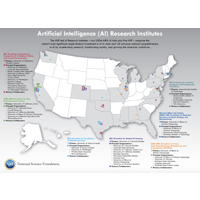
NSF Advances Artificial Intelligence Research with New Nationwide Institutes
This article is a press release from the National Science Foundation about the newly announced Artificial Intelligence (AI) Institutes.

Archive of articles published in the 2020 issue.

This article is a press release from the National Science Foundation about the newly announced Artificial Intelligence (AI) Institutes.

Among non-student professionals in computing-related jobs, women and non-binary gendered survey respondents report lower confidence in their ability to negotiate for resources in their job. There were no statistically significant differences in survey respondents’ confidence to speak up about issues in meetings or with their supervisor.

The CRA Center for Evaluating the Research Pipeline (CERP) recently published a webinar featuring the Data Buddies Survey (DBS).
This webinar details some of the background of the Data Buddies Survey, tips for good response rates, benefits for participating departments, and requirements for participating departments. This webinar is designed for a broad audience, including prospective DBS participants. You can view the webinar by clicking here.
If you would like to volunteer your department to join DBS, you can sign up here.
Email the CERP team with questions or comments at cerp@cra.org.
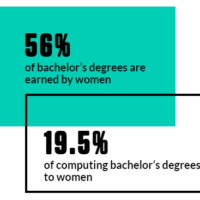
Housed at Northeastern’s Khoury College of Computer Sciences, the Center for Inclusive Computing (“the Center”) serves as a catalyst in helping universities take the lead in educating more women in computing, both to meet a significant economic need and to address the issues of social inequity and exclusion. The Center awards funding to colleges and universities to scale best practices known to increase the representation of women in undergraduate computing. While these best practices are well documented and widely known, stagnant percentages indicate that uptake has been slow.
In order to accelerate change, the Center invites nonprofit colleges and universities to apply for one of two funding opportunities: Best Practice Grants and Data Grants.
To learn if your institution is eligible and how to apply, please visit our website for more information or email inquiries to khoury-cic@northeastern.edu.
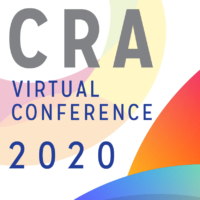
For nearly 50 years, the Computing Research Association (CRA) has brought the leadership of the computing research community together every other year at Snowbird, UT to discuss community issues. The COVID-19 pandemic interrupted our plans to hold an in-person event this year, just like it has disrupted much of our way of life, both professionally and personally. After canceling the in-person event, CRA quickly pivoted to provide the conference in an online format with specialized content addressing the current environment and challenges during these unprecedented times. CRA Board members Ran Libeskind-Hadas and James Allan stepped up as chair and co-chair of the Virtual Conference.
Conference sessions provided a community forum to share best practices for continuing to navigate the unpredictable challenges imposed during the coronavirus pandemic and addressing community issues around race, equity, and equality. The conference videos are now available here and lightning talk videos are available here.
Last year, the CRA Board embarked on a process to develop a strategic plan to guide the organization into the future. At the conference, there were two interactive sessions to discuss from CRA members and CRA’s Strategic Planning initiative and gather feedback. This exercise to collect information occurred at a point when the plan has shape, yet room for constructive input regarding the priorities and essential factors for successful implementation of the emerging CRA Strategic Plan. CRA shared draft versions of the revised mission, priority outcomes, objectives, and initiatives that have been developed following extensive analysis and board input over the past year. The community feedback will be used to help determine what to focus on first and to identify key success factors.
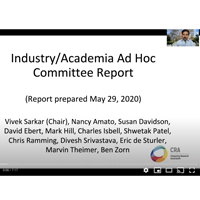
Recent trends such as increasing industry demands for technical talent from academia, as well as changes in the academic environment with increased industry interactions have prompted the need for a fresh look at the relationships between academia and industry. A CRA ad hoc committee on Industry/Academia Interactions was studied these trends and determined how CRA can have an impact. The committee report is available here, and video presentation here.
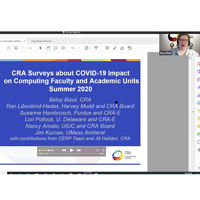
CRA conducted two surveys about the COVID-19 disruption in summer 2020. The first surveyed computer science faculty members who made the transition from teaching in-person to teaching online as the result of the COVID-19 pandemic. The survey asked faculty members about their perceptions of the challenges in moving to emergency online instruction and also about planning for the fall 2020 term. In early July, CRA surveyed the chairs of doctoral and non-doctoral departments. They were asked about the impact of COVID-19 so far on their faculty, department operations, student job searches, and budgets. They were also asked about their expectations and concerns for fall 2020. Both reports are available here. CRA Director of Statistics and Evaluation Betsy Bizot recently presented the survey results at the ACM Education Advisory Committee Meeting. Click here to view the clip of her presentation.
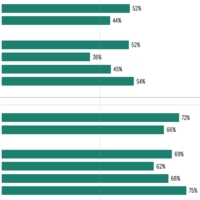
Analysis of how welcome students feel in computing by intersections of race/ethnicity and gender, and disability status and gender shows that there are significant differences between students from various demographic groups ranging from 36% (Black women) to 75% (White men) of students in each group.

In support of the NSF CISE initiative to Broaden Participation in Computing (BPC) and BPCnet.org, CERP has created a web app to facilitate access to statistics helpful to the CRA community. This web app can be used to quickly generate statistics for use in NSF proposals, particularly those that require BPC Plans.

July 1st was the start of a new term at CCC! The Computing Community Consortium (CCC) is happy to announce that Liz Bradley from the University of Colorado-Boulder is the new Chair and Dan Lopresti from Lehigh University is the Vice Chair. Mark D. Hill from the University of Wisconsin-Madison is the Chair Emeritus. The CCC Chair and Vice Chair both serve two-year terms; at the culmination of the two years, the Vice Chair typically becomes the new Chair.
The CCC also welcomes seven new council members, nominated by colleagues in the computing research community.
This website uses cookies so that we can provide you with the best user experience possible. Cookie information is stored in your browser and performs functions such as recognising you when you return to our website and helping our team to understand which sections of the website you find most interesting and useful. You can adjust all of your cookie settings.
